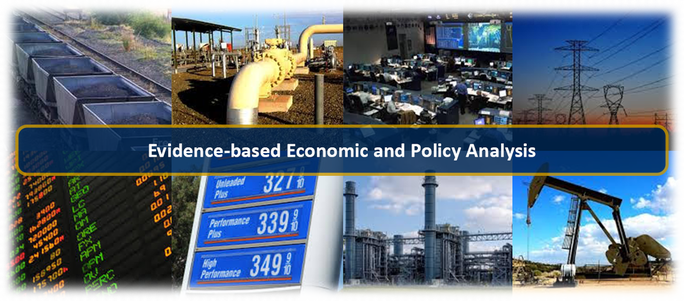
The state of California has long been a source of innovation and experimentation in the regulation, organization, and technological development of the energy industries. The energy industries account for nearly 9% of GDP and over 75% of greenhouse gasses. The Davis Energy Economics Program supports economic research on all aspects of the energy industries, spanning fuels markets, energy consumption, electricity regulation and deregulation, vehicle markets, and emissions trading.
The Davis Energy Economics Program spans several units at UC Davis, including Economics, Agricultural and Resource Economics, Environmental Sciences, and the Institute for Transportation Studies. DEEP provides an intellectual hub through which the Davis energy economics community, industry, and policymakers can gather and exchange ideas, research, and information on the challenges and opportunities facing today’s energy sector.
DEEP People
DEEP Seminars
- Economic and Environmental Cost of Hydro Flow Constraints
Jim Archsmith from UC Davis
December 7, 2016
- RIN Pass-Through to Retail E85 Prices Under the Renewable Fuel Standard
Gabe Lade from Iowa State University
November 30, 2016
- TBA
November 16, 2016
Steve Sexton from Duke University
- The Local Environmental Consequences of Coal Procurement at U.S. Power Plants
Akshaya Jha from Carnegie Mellon University
November 2, 2016
- Energy Savings from Residential Building Codes: Evidence from Hourly California Smart-Meter Data
Aaron Smith and Kevin Novan from UC Davis
October 26, 2016
- TBA
Kyle Meng from UC Santa Barbara
October 19, 2016
- The Non-Abatement of Methane Leaks
Catie Hausman from University of Michigan
October 12, 2016
Click here for Past Seminars
DEEP Papers
- Air Pollution and Criminal Activity: Evidence from Chicago Microdata
Published December 8, 2015 by Evan Hernstadt and Erich Muehlegger.
View the abstract.Return to the Papers listing. | Download the paper.
A large and growing literature documents the adverse impacts of pollution on health, productivity, educational attainment and socioeconomic outcomes. This paper provides the first quasi-experimental evidence that air pollution casually affects ...
- From Cradle to Junkyard: Assessing the life cycle Greenhouse Gas Benefits of Electric Vehicles
Published August 25, 2015 by David Rapson.
View the abstract.Return to the Papers listing | Download the paper.
U.S. programs subsidize electric vehicles (EVs) in part to reduce greenhouse gas (GHG) emissions. We model a suite of life cycle GHG emissions considerations to estimate the GHG abatement potential from switching from ...
- Commodity Storage and the Market Effects of Biofuel Policies
Published July 1, 2015 by Aaron Smith.
View the abstract.Return to the Papers listing | Download the paper.US legislation passed in 2007 (RFS2) increased by about 1.3 billion bushels the net amount of corn required to be processed annually into ethanol for motor-fuel use. Using modern time-series methods, we ...
- Rethinking Trade-Exposure: The Incidence of Environmental Charges in the Nitrogenous Fertilizer Industry
Published June 1, 2015 by Jacob Humer and James Bushnell.
View the abstract.Return to the Papers listing. | Download the paper.The imposition of environmental regulations, such as greenhouse gas charges, to domestic manufacturing traditionally creates concerns over the impacts of those regulations on international competition and downstream product prices. ...
- Utilization and Customer Behavior: Smart Choices for the Smart Grid
Published May 3, 2015 by Jeremy B. Smith.
View the abstract.Return to the Papers listing. | Download the paper.The smart grid offers a wide array of opportunities to improve efficiency of the electricity grid via load management policies. This chapter reviews the current state of knowledge in the economics literature ...
- Overlapping Environmental Policies and the Impact on Pollution
Published April 29, 2015 by Kevin Novan.
View the abstract.Return to the Papers listing. | Download the paper.In an effort to reduce pollution from the electricity sector, governments are heavily subsidizing renewables. The subsidies, however, are not being used in isolation. Instead, they are often provided in regions where ...
- Commercial and Industrial Demand Response Under Mandatory Time-of-Use Electricity Pricing
Published March 17, 2015 by David Rapson.
View the abstract.Return to the Papers listing. | Download the paper.This paper is the first to evaluate the impact of a large-scale field deployment of mandatory time-of-use (TOU) pricing on the energy use of commercial and industrial firms. The regulation imposes higher ...
- Policy Shocks and Market-Based Regulations: Evidence from the Renewable Fuel Standard
Published May 7, 2015 by Aaron Smith.
View the abstract.Return to the Papers listing. | Download the paper.The Renewable Fuel Standard (RFS2) is a US federal policy that mandates large increases in biofuel consumption and is implemented using a market for tradeable compliance credits. We develop a dynamic model ...
Click here for Additional Papers
DEEP Contact
James Bushnell
Professor, Department of Economics
jbbushnell@ucdavis.edu
530-752-3129
